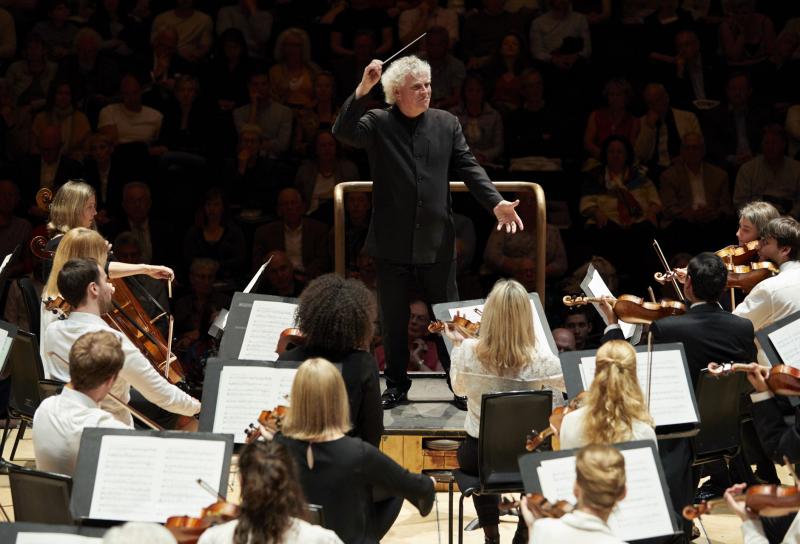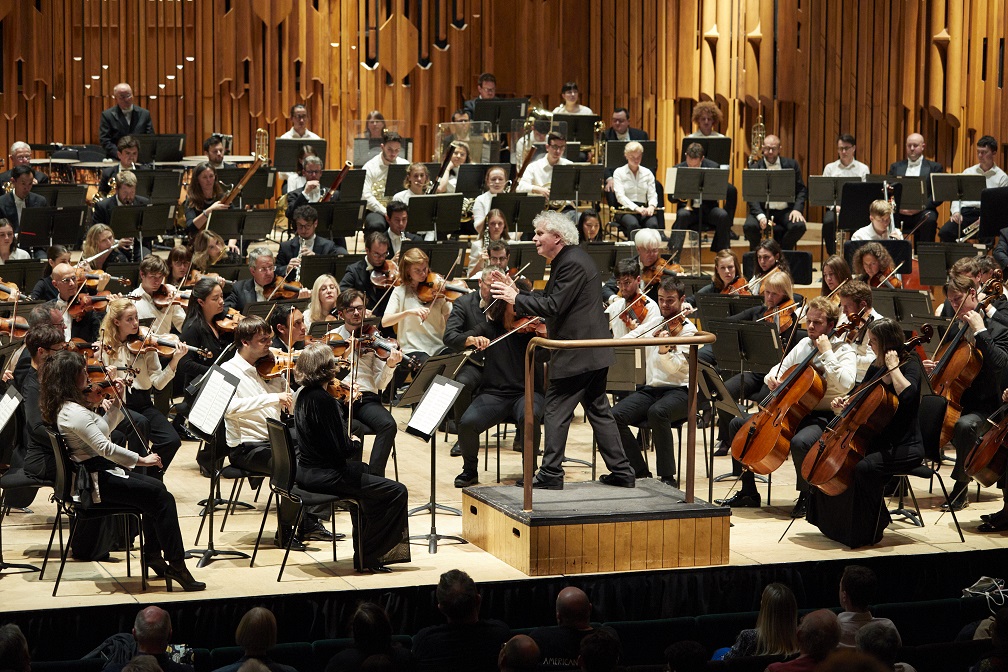LSO, Guildhall School, Rattle, Barbican review - irresistible momentum | reviews, news & interviews
LSO, Guildhall School, Rattle, Barbican review - irresistible momentum
LSO, Guildhall School, Rattle, Barbican review - irresistible momentum
Patience pays off in sublime Bruckner

The Barbican Hall hardly boasts the numinous acoustic of Gloucester Cathedral for which Vaughan Williams composed his Fantasia on a Theme of Thomas Tallis, but Sir Simon Rattle has long known how to build space into the architecture of what he conducts.
No indulgences needed to be made for the students of the Guildhall School of Music next door. They slotted seamlessly within the ranks of the LSO to conjure a luminous halo of string sound, untroubled by the sense of loss which belongs to the piece in more lean and urgent performances. Their wind colleagues then filled the stage for Percy Grainger’s Lincolnshire Posy, a more eccentric and rumbustious take on English folk culture.
But this concert was all about the second half: a sublime account of Bruckner’s Fourth Symphony, endowed with expectation and momentum from the opening bars. Rattle found a logically related tempo for all four movements so that they unfolded in a single, glorious span. Fanfare, chorale and country dance are Bruckner’s found objects of inspiration. Here they were woven together into a story always on the move, and towards an apotheosis both inevitable and yet unforeseen.

Too often the Fourth Symphony, even when well played, seems to rest on its haunches – at least when compared with the more angular cast of the Fifth and Ninth, say, the steady purpose of the Sixth or the dark-to-light journey of the Eighth. On this occasion the horn solo outlined the symphony’s motto-theme through tremolo mists not with satisfied nobility but as a dawning of new life. And Rattle's Bruckner has sometimes struggled to transcend a fixation with fine detail and the cultivation of a sleek legato. Not last night. Rarely since the death of Günter Wand – in 2002 – have I encountered a Bruckner movement sustained throughout with such a consistent pulse.
It established a momentum that carried over into the Andante, which here lost nothing by comparison with Mozart and Wagner – Bruckner’s lodestars in their very different ways – for the simultaneous expression of joy and melancholy. The 10-bar coda, stifled and even cursory in other hands, for once felt like a masterstroke, postponing resolution and throwing light on the Trio of the Scherzo as the symphony’s one true point of rest. In this regard and others the Fourth was illuminated as the sequel to Schubert’s Ninth, as a "summer journey" symphony of sublime scale but no less ineluctable momentum.
Bruckner doesn’t make life easy for the conductor with the glorious rediscovery of the motto theme just a few minutes into the finale. Where to go from there? Into the woods again, in short, because there is always more to find – a version of the first movement’s second theme more outgoing than before, as though the symphony were analysing itself in progress. Even the clunky transition where Bruckner threatens to settle into a Pomp and Circumstance march was shaded off with charm and grace. This Fourth didn’t share the emotive grandeur of Bernard Haitink’s valedictory thoughts on the piece, from earlier this year, but its coda attained a genuine sublimity that seemed to take even Rattle and his musicians by surprise.
rating
Explore topics
Share this article
Add comment
The future of Arts Journalism
You can stop theartsdesk.com closing!
We urgently need financing to survive. Our fundraising drive has thus far raised £49,000 but we need to reach £100,000 or we will be forced to close. Please contribute here: https://gofund.me/c3f6033d
And if you can forward this information to anyone who might assist, we’d be grateful.

Subscribe to theartsdesk.com
Thank you for continuing to read our work on theartsdesk.com. For unlimited access to every article in its entirety, including our archive of more than 15,000 pieces, we're asking for £5 per month or £40 per year. We feel it's a very good deal, and hope you do too.
To take a subscription now simply click here.
And if you're looking for that extra gift for a friend or family member, why not treat them to a theartsdesk.com gift subscription?
more Classical music
 BBC Proms: Akhmetshina, LPO, Gardner review - liquid luxuries
First-class service on an ocean-going programme
BBC Proms: Akhmetshina, LPO, Gardner review - liquid luxuries
First-class service on an ocean-going programme
 Budapest Festival Orchestra, Iván Fischer, Edinburgh International Festival 2025 review - mania and menuets
The Hungarians bring dance music to Edinburgh, but Fischer’s pastiche falls flat
Budapest Festival Orchestra, Iván Fischer, Edinburgh International Festival 2025 review - mania and menuets
The Hungarians bring dance music to Edinburgh, but Fischer’s pastiche falls flat
 Classical CDs: Hamlet, harps and haiku
Epic romantic symphonies, unaccompanied choral music and a bold string quartet's response to rising sea levels
Classical CDs: Hamlet, harps and haiku
Epic romantic symphonies, unaccompanied choral music and a bold string quartet's response to rising sea levels
 Kolesnikov, Tsoy / Liu, NCPA Orchestra, Chung, Edinburgh International Festival 2025 review - transfigured playing and heavenly desire
Three star pianists work wonders, and an orchestra dazzles, at least on the surface
Kolesnikov, Tsoy / Liu, NCPA Orchestra, Chung, Edinburgh International Festival 2025 review - transfigured playing and heavenly desire
Three star pianists work wonders, and an orchestra dazzles, at least on the surface
 BBC Proms: Láng, Cser, Budapest Festival Orchestra, Iván Fischer review - idiomatic inflections
Bartók’s heart of darkness follows Beethoven’s dancing light
BBC Proms: Láng, Cser, Budapest Festival Orchestra, Iván Fischer review - idiomatic inflections
Bartók’s heart of darkness follows Beethoven’s dancing light
 Weilerstein, NYO2, Payare / Dueñas, Malofeev, Edinburgh International Festival 2025 review - youthful energy and emotional intensity
Big-boned Prokofiev and Shostakovich, cacophonous López, plus intense violin/piano duo
Weilerstein, NYO2, Payare / Dueñas, Malofeev, Edinburgh International Festival 2025 review - youthful energy and emotional intensity
Big-boned Prokofiev and Shostakovich, cacophonous López, plus intense violin/piano duo
 theartsdesk at the Three Choirs Festival - Passion in the Cathedral
Cantatas new and old, slate quarries to Calvary
theartsdesk at the Three Choirs Festival - Passion in the Cathedral
Cantatas new and old, slate quarries to Calvary
 BBC Proms: Estonian Philharmonic Chamber Choir, Kaljuste review - Arvo Pärt 90th birthday tribute
Stillness and contemplation characterise this well sung late-nighter
BBC Proms: Estonian Philharmonic Chamber Choir, Kaljuste review - Arvo Pärt 90th birthday tribute
Stillness and contemplation characterise this well sung late-nighter
 BBC Proms: Kholodenko, BBCNOW, Otaka review - exhilarating Lutosławski, underwhelming Rachmaninov
Polish composers to the fore in veteran conductor’s farewell
BBC Proms: Kholodenko, BBCNOW, Otaka review - exhilarating Lutosławski, underwhelming Rachmaninov
Polish composers to the fore in veteran conductor’s farewell
 theartsdesk at the Pärnu Music Festival 2025 - Arvo Pärt at 90 flanked by lightness and warmth
Paavo Järvi’s Estonian Festival Orchestra still casts its familiar spell
theartsdesk at the Pärnu Music Festival 2025 - Arvo Pärt at 90 flanked by lightness and warmth
Paavo Järvi’s Estonian Festival Orchestra still casts its familiar spell
 BBC Proms: Batsashvili, BBC Scottish Symphony Orchestra, Ryan Wigglesworth review - grief and glory
Subdued Mozart yields to blazing Bruckner
BBC Proms: Batsashvili, BBC Scottish Symphony Orchestra, Ryan Wigglesworth review - grief and glory
Subdued Mozart yields to blazing Bruckner

Comments
The first performance of the
Corrected, with thanks.
Corrected, with thanks.